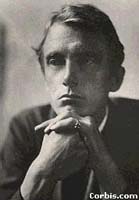The Glory Poem by Edward Thomas
The Glory
The glory of the beauty of the morning, -
The cuckoo crying over the untouched dew;
The blackbird that has found it, and the dove
That tempts me on to something sweeter than love;
White clouds ranged even and fair as new-mown hay;
The heat, the stir, the sublime vacancy
Of sky and meadow and forest and my own heart: -
The glory invites me, yet it leaves me scorning
All I can ever do, all I can be,
Beside the lovely of motion, shape, and hue,
The happiness I fancy fit to dwell
In beauty's presence. Shall I now this day
Begin to seek as far as heaven, as hell,
Wisdom or strength to match this beauty, start
And tread the pale dust pitted with small dark drops,
In hope to find whatever it is I seek,
Hearkening to short-lived happy-seeming things
That we know naught of, in the hazel copse?
Or must I be content with discontent
As larks and swallows are perhaps with wings?
And shall I ask at the day's end once more
What beauty is, and what I can have meant
By happiness? And shall I let all go,
Glad, weary, or both? Or shall I perhaps know
That I was happy oft and oft before,
Awhile forgetting how I am fast pent,
How dreary-swift, with naught to travel to,
Is Time? I cannot bite the day to the core.
This poem has not been translated into any other language yet.
I would like to translate this poem
“The Glory”, one of Edward Thomas’ most complex poems, is a work of paradoxical genius. Thomas finds himself confronted with “The glory of the beauty of the morning”, and, as he vainly attempts to describe the beauty of the situation that faces him, he is overwhelmed by his own inadequacy as a poet. The paradox of the poem though, is that in describing his own failings as a poet, because he has done so with such consummate literary skill, Thomas has actually confirmed to the reader his status as a poet with great talent and ability